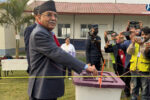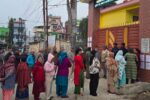The new coalition government, comprising the Communist Party of Nepal-Unified Marxist Leninist (CPN-UML) and the Nepali Congress (NC), may have sparked a wave of optimism across the country with a promise of political stability.
For many, the unprecedented alliance led by Prime Minister K.P. Sharma Oli has been a beacon of hope to lead the country on the path of steady development.
Expectations of this coalition are immense, and the path ahead is fraught with challenges. This work presents the key expectations and challenges of the government in a nutshell.
Political Stability
Political stability is one of the foremost expectations from the UML-NC coalition. Nepal has witnessed a tumultuous political landscape over the past decades, with frequent changes in government affecting the pace of development.
Short-term governments mean inconsistency in policies and clumsy administration. Infrastructure work has been hampered, slowing down the pace of development.
As two major political parties steer the government, it is the right time to form a concrete foreign policy by engaging experts and representatives from other political parties.
The coalition is expected to create a stable political environment by fostering cooperation and understanding between the coalition partners.
However, Prime Minister Oli’s ability to maintain harmony within the coalition has been questioned, as internal conflicts and lack of inter-ministry coordination have hindered the government’s effectiveness in service delivery.
Economic Reform and Development
An improved economy is another critical area where the coalition government is expected to make a significant stride.
Nepal’s economy has been struggling with issues such as unemployment, underdevelopment, and scant foreign investment.
Despite promises of comprehensive economic reforms—including improving infrastructure, creating a business-friendly environment, and attracting foreign investment—the government has fallen short.
The anticipated economic growth and job creation have not materialized, leaving many Nepalis disillusioned.
As such, the youth continue to leave the country either for higher education and a better life abroad or for employment in the informal sector.
The immediate need is to come up with a development package that will retain the youth, who will contribute to the development of their own country instead of shedding sweat on foreign soil.
The right start would be to lay the groundwork for youth employment by designing a long-term program.
Technically skilled youth, such as doctors, engineers, and university graduates, can be mobilized in rural Nepal by providing high incentives.
Health posts can be equipped with medical doctors. Engineers can be employed for the much-needed infrastructure development.
Construction work across the country can absorb the unskilled youth workforce.
Improved Foreign Relations
As for foreign policy, the coalition government is expected to strengthen Nepal’s relations with its neighbors and the international community.
Maintaining a balanced relationship with both India and China is essential for Nepal’s strategic interests.
Additionally, fostering ties with other global powers is an effective way to open avenues for foreign aid and investment.
However, Prime Minister Oli’s diplomatic efforts have been inconsistent, leading to strained relations and missed opportunities for economic collaboration.
Ensuring that the amendments promote democracy, stability, and inclusivity is vital for the long-term success of the coalition government.
As two major political parties steer the government, it is the right time to form a concrete foreign policy by engaging experts and representatives from other political parties.
Inclusive Social Development
The coalition government is also expected to prioritize inclusive social development.
Addressing issues such as education, healthcare, and poverty alleviation is crucial for the overall development of the nation.
Policies that promote equitable access to essential services and uplift marginalized communities are key to achieving social justice.
Unfortunately, the government’s efforts in these areas have been inadequate, with many social programs failing to reach those in need.
Social protection measures, such as insurance, have failed to reach the critical mass.
There is a wide gap in the quality of education accessed by the poor and the rich.
As Nepal navigates this new political landscape, the coalition government faces the daunting task of meeting the high expectations of its citizens.
A similar situation exists in healthcare facilities. The government needs to come up with innovative and effective measures to address social inequality.
Constitutional Amendment
One of the significant expectations from the UML-NC coalition is the amendment of the 2015 Nepali Constitution.
The coalition aims to make the constitution more inclusive and reflective of the current political and social realities.
Ensuring that the amendments promote democracy, stability, and inclusivity is vital for the long-term success of the coalition government.
However, progress on constitutional amendments has been slow, and the coalition has struggled to build consensus on key issues.
Prime Minister K.P. Sharma Oli now stands at a critical juncture. The challenges are manifold, and the government’s inability to meet these expectations has led to widespread disappointment.
By failing to deliver on promises of political stability, economic reforms, foreign relations, social development, and constitutional amendments, the coalition risks losing the trust of the Nepali people.
As the country awaits the general election in 2027, the major parties face the prospect of a significant loss, as voters may look for alternatives that can better fulfill their aspirations for a prosperous and stable Nepal.
The coming months will be a crucial test of the coalition’s ability to regain the confidence of the electorate and deliver on its promises.
As Nepal navigates this new political landscape, the coalition government faces the daunting task of meeting the high expectations of its citizens.
The road ahead is challenging, but with concerted effort and genuine cooperation, there is hope for a brighter future.
(Shirish A. Adhikari is a seasoned development practitioner with over two decades of experience in the fields of Water, Sanitation, and Hygiene, climate change, and resilient infrastructure)









Comment